The reign of terror, the period in the French revolution when around forty thousand people lost their lives in the name of the revolution was the climax of the French Revolution. The revolution itself was caused by a combination of factors the led to an economic and social crisis that left the French third class little choice but to revolt. There were also more immediate causes of the period of terror such as the downfall of the Girondins and the Sans-culottes taking extreme measures to protect their new republic. The consequences of the period of terror were apparent as soon as the fires of terror had burnt itself out. Many of the very moderates and extremists had been executed leaving the reformers standing on middle ground to eventually form the constitution and build a new republic, this ensured that the revolution had been successful.
In the beginning the French Revolution had been more intellectual, fuelled by the ideas of the enlightenment, but towards the period of terror the revolution had increasingly been shaped by more social and economic factors.
(Doyle, 1989, p.392) In 1792, three years after the revolution had started life had not gotten any better for much of the population, in fact life for many of the lower classes was worse than ever. The revolution until now had been staged by the middle class and had therefore mainly benefited this group. Starvation throughout the lower classes was rampant due to inflation of food prices, it was this situation that sparked the next phase of the revolution.
At this time the National Assembly, (the governing body of France at this time) was under increasing pressure from the rest of Europe to restore the Monarchy. By this time Austria and Prussia had, with the encouragement of Louis XVI already declared war on France. (Thomson, 1990, p.34)
The National Assembly who was at this time controlled by the more moderate Girondins had to declare war on Austria and Prussia to maintain their political position. (Hooker, 1996, p.1)
Things for the moderate Girondins were getting bad, as the Austrian and Prussian armies invaded France the lower classes revolted and attacked the royal palace. Louis XVI fled and tried to find haven with the Assembly, but the radicals had seized the government and persuaded the Assembly to hand Louis XVI and his family over to be tried for treason. It was around this time that the revolution became bloodier than ever, executions were becoming a more accepted solution to the problems of the revolution , it was at this time that the September massacres occurred. (Doyle, 1989, p.397)
The Girondins were held responsible for the affairs so far and power was turned over to the more radical Jacobins. The Jacobins aims were to do away with all social distinction and the monarchy, (Palmer, 1964, p.166) as they rose to power the Jacobins called for a national convention to form a new republic constitution that would do away with the previous constitution that included a monarch. Along with the Jacobins another more radical group rose to power, from the lower classes of Paris, the Sans-culottes. The Sans-culottes and the more radical of the Jacobins shared similar aspirations of getting rid of the monarchy, abolishing inequalities of any kind and sharing all properties. As the economy worsened, the convention either had to take greater control of all aspects of the economy or return to the days of the free market, they decided on the former and tightened their control over all aspects of society. The national convention fell more and more under the control of these more radical influences and in 1793 they had effectively taken over the national convention and soon put their power into play by putting Louis XVI on trial. On January 21st, 1793, Louis XVI was beheaded. (Thomson, 1990, p.34)
The terror had become the order of the day and with it came a major change in the mood and mentality of the revolution. The convention brought in new laws such as the Law of Suspects, which allowed anyone suspected of being an enemy of the revolution could be imprisoned and tried, this was enforced by the revolutionary army who were brought in to intimidate, punish and arrest any suspects. (Sutherland, 1986, p.258)
By September 1793 all of Europe was at war with France, the French army was struggling and the convention was forced in desperation to draft all males capable of fighting to secure their borders. In France, the convention delayed its creation of a democratic government because of the wars and civil unrest and instead created a Committee of Public Safety. Two of the Committees main roles were to restore stability to the country by eliminating enemies of the revolution and Christianity, this they thought would help create a true revolution. (Sutherland, 1986, p.252) The convention gradually transferred more and more of its powers to the Committee of Public Safety which was mainly led by three men, Marat, Danton and the most renowned of the three, Robespierre. The Committee was very efficient at it's role of eliminating enemies of the revolution and got even more so when Robespierre introduced a new law, the Law of 22 Prairial, which allowed tribunals to convict accused enemies without hearing any evidence. (Bienvenu, 1968, p.68)
At this time Robespierre had been seemly aspiring to some form of personal dictatorship and to make matters worse had further alienated the convention by announcing that the Committee of Public Safety would tolerate "neither counter revolutionary moderation of divisive extremism". (Bienvenu, 1968, p.70)
Robespierres opponents, decided to put and end to the terror as it had reached the point of, kill your political opponents or be killed yourself. Robespierre had fatally overestimated his support among his deputies. (Sutherland, 1986, p.280)
In July 1794 the radical leaders of the convention including Robespierre were either executed or powerless, the terror was no more. A new more moderate convention repealed the Law of 22 Prairial, freed the political prisoners, and stripped the Committee of Public Safety of all its powers. As many of the more radical Jacobins were either executed or were in hiding and only the more moderate thinkers were left, it was up to them to finish drawing up the constitution. It was up to these men that France in 1795 finally became a democratic republic.
In 1797 France held its first democratic elections. An overwhelming amount of constitutional monarchists were voted in so the Directory declared the elections invalid. France fell into chaos and the head of the Directory called upon Napoleon Bonaparte to overthrow the legislators and create a new constitution. (Hooker, 1996, p.6) In 1799 new constitution was drawn up that modeled the French republic on the Roman Republic. The Revolution was over.
Although France did eventually restore the Bourbon dynasty, which seemed in direct contrast to the aspirations of the revolution, the fundamental changes to society that had occurred because of the revolution stayed; the principles of liberty and equality. The reign of terror played an important role in the revolution in establishing the importance of democratic institutions that accept that allowing opposition in the political spectrum plays a vital role in ensuring the liberty of all members of society no matter what their beliefs.
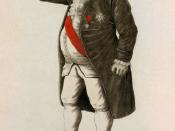
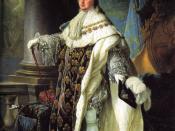
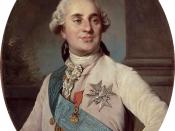
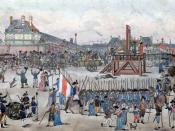
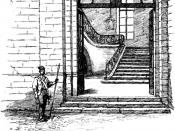

Great work cites
Well put together essay and nice sitings.
0 out of 1 people found this comment useful.